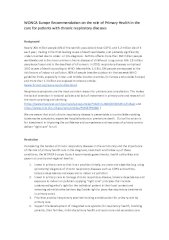
WONCA Europe Recommendation on the role of Primary Health in the care for patients with chronic respiratory diseases
Background
Nearly 200 million people (4% of the world’s population) have COPD, and 3.2 million die of it each year, making it the third leading cause of death worldwide, and probably significantly under-counted due to under- or mis-diagnosis. Asthma affects more than 350 million people worldwide and is the most common chronic disease of childhood. Lung cancer kills 1.8 million people each year and is the deadliest of all cancers. In 2019, respiratory diseases comprised 3/10 causes of death according to WHO. Meanwhile, 2.4 BILLION people are exposed to the risk factors of indoor air pollution, 90% of people breathe outdoor air that exceeds WHO guideline limits, especially in low- and middle-income countries (in Europe and outside Europe) and more than 1.3 billion are exposed to tobacco smoke. (www.firsnet.org/resources/publications).
Respiratory symptoms are the most common reason for primary care consultation. This makes the lack of attention in national policies and lack of investment in primary care and research all the more surprising and alarming. (https://www.thelancet.com/journals/lanres/article/PIIS2213-2600(20)30329-5/fulltext and https://www.ncbi.nlm.nih.gov/pmc/articles/PMC8799668/ )
We are aware that much chronic respiratory disease is preventable or controllable avoiding burdensome symptoms, expensive hospitalisations or premature death. Our call to action is for investment in improving the confidence and competence and resources of primary care to deliver “right care” for all.
Resolution
Considering the burden of chronic respiratory diseases in the community and the importance of the role of primary health care in the diagnosis, treatment and follow-up of these conditions, the WONCA Europe Council recommends governments, health authorities and payors at country and regional level to:
-
Invest in primary care so that it can provide a timely, accurate and objective (e.g. using spirometry) diagnosis of chronic respiratory diseases such as COPD and asthma, tobacco dependence and exposure to indoor air pollution
-
Invest in primary care to manage chronic respiratory disease, tobacco dependence and exposure to indoor air pollution applying “right care” principles that include understanding what’s right for the individual patient in their local context and removing administrative barriers (e.g. Enable right to prescribe respiratory treatments in primary care).
-
Prioritise practical respiratory peer-led training and education for primary care by primary care
-
Support the development of integrated care systems for respiratory health, involving patients, their families, multi-disciplinary health and social care and secondary care
-
Fund the generation of real-life evidence to feed respiratory guidelines that are useful in primary care, e.g. implementation research
-
Recognise primary care as population health educators e.g. about physical activity, nutrition, substance use and how to breathe well
-
Negotiate and fund the right incentives for primary care to practise population respiratory heath: to go where the people in need are
-
Fund universal access to good quality affordable and effective vaccinations, inhaled medicines and tobacco dependence treatment and training in how to use them
-
Recognise primary care societies that can leverage major clinician-led change working locally, collaborating globally
- Access
- Public
- Year
- 2023
